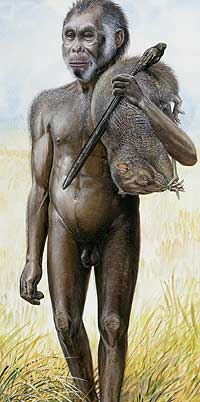October 28, 2004
Hominin, hominid, hominoid, whatever
 Reading about the Javanese hobbits in Nature, you may wonder whether hominin is a typo for hominid; and then, realizing that it isn't, you may wonder what the difference really is. Dictionaries won't help you -- at least none of the ones that I have do. Hominin isn't even in the OED or the American Heritage Dictionary or Merriam-Webster's 3rd Unabridged or the online version of Encarta. But Thomas Greiner explains it all here:
Reading about the Javanese hobbits in Nature, you may wonder whether hominin is a typo for hominid; and then, realizing that it isn't, you may wonder what the difference really is. Dictionaries won't help you -- at least none of the ones that I have do. Hominin isn't even in the OED or the American Heritage Dictionary or Merriam-Webster's 3rd Unabridged or the online version of Encarta. But Thomas Greiner explains it all here:
...when scientists use the word hominin today, they mean pretty much the same thing as when they used the word hominid twenty years ago. When these scientists use the word hominid, they mean pretty much the same thing as when they used the word hominoid twenty years ago.
This is one of the consequences of insisting on an distinguishing certain types of evolutionary "clades" as the well-defined taxonomic levels of class, order, family, genus, species -- just like we distinguish particular levels of government in the U.S. as state, county, city.
Recent work shows that apes are not a monophyletic group (all descended from one ancestor), so that chimps and gorillas share a more recent ancestor with humans than they do with the orangutan. That means that, on the strict taxonomic level, chimps and gorillas are hominids. There are some specialists that use the term in this way -- although it gets very confusing when they do. If chimps and gorillas are hominids, what then do we call the group that leads to humans but not to chimps and gorillas? For that, we come up with a new taxonomic level called Tribe, that lies between Family and Genus. The Tribe hominini describes all the human species that ever evolved (including the extinct ones) that excludes the chimps and gorillas.
That's us hominins, if you're keeping score at home.
Advantage, Google (lexicographically speaking).
It's not clear that insisting on these qualititative distinctions among cladistic levels is really doing enough work to be worth the trouble, whether in naming clades or in assigning scientific names to species. Kevin de Queiroz and the rest of the PhyloCode gang think that it's all a big mistake, an early-enlightenment missstep like the phlogiston theory, and ought to be tossed, leaving species (= terminal node) and clade (= non-terminal node) as the only qualitatively-distinguished categories in the evolutionary tree. At least, I think that's what they think! In any case, it's very much a minority view these days, but it seems to be gaining ground. (As it happens, I've been meaning to try to understand -- and blog about -- PhyloCode for a while now, and this is some new motivation. If the creeks don't rise, I'll get to it within a week or so).
Posted by Mark Liberman at October 28, 2004 04:53 AM